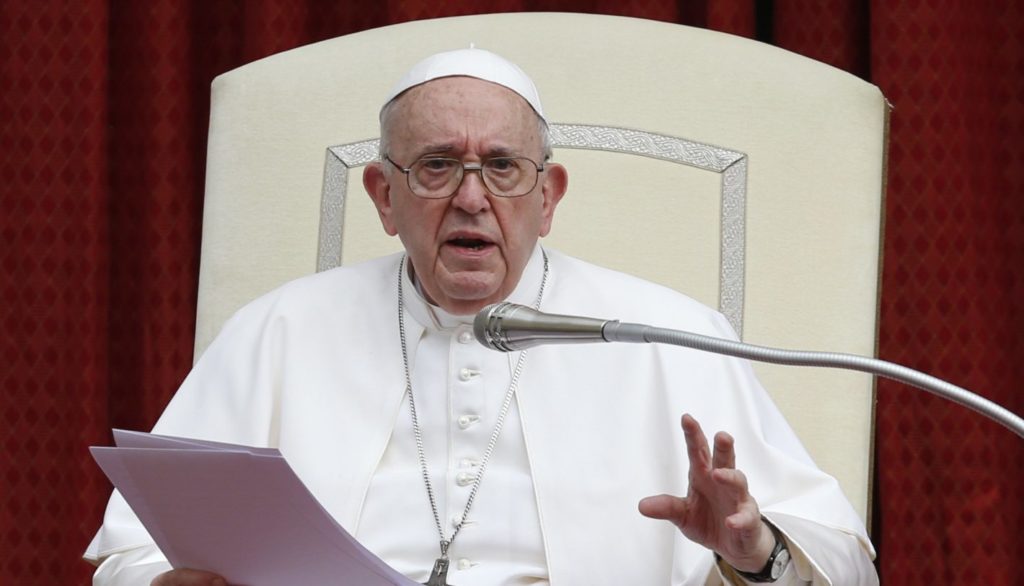Pope Francis began the cycle of catecheses by commenting on the Letter of St. Paul to the Galatians, which "we are entering into little by little." "We have seen that these Christians," the Holy Father begins, "find themselves in conflict over how to live the faith. The Apostle Paul begins writing his Letter by reminding them of their past relationships, their discomfort over the distance and the unchanging love he has for each of them. However, he does not fail to point out his concern that the Galatians follow the right path: it is the concern of a father, who generated the communities in the faith. His intention is very clear: it is necessary to reaffirm the newness of the Gospel, which the Galatians have received from his preaching, in order to build the true identity on which to found their own existence".
The Pope highlights the Apostle's profound knowledge of the mystery of Christ. "From the beginning of his Letter, he does not follow the low arguments of his detractors. The apostle "flies high" and indicates to us too how to behave when conflicts arise within the community. In fact, it is only towards the end of the Letter that it is made clear that the core of the controversy that has arisen is that of circumcision, and therefore of the main Jewish tradition. Paul chooses to go deeper because what is at stake is the truth of the Gospel and the freedom of Christians, which is an integral part of the Gospel. He does not stop at the surface of the problems, as we are often tempted to do in order to find an illusionary solution that will get everyone to agree on a compromise. It does not work that way with the Gospel and the Apostle has chosen to follow the more arduous path. He writes: "For do I now seek the favor of men or the favor of God, or do I try to please men? If I were still trying to please men, I would no longer be a servant of Christ" (Gal 1,10)".
"First of all, Paul feels it his duty to remind the Galatians that he is a true apostle not by his own merit, but by God's call. He himself tells the story of his vocation and conversion, which coincides with the appearance of the Risen Christ during the journey to Damascus (cfr. Ac 9,1-9). It is interesting to note what he says about his life prior to this event: "I persecuted the Church of God fiercely and devastated it, and how I surpassed in Judaism many of my contemporary compatriots, surpassing them in zeal for the traditions of my fathers" (Gal 1,13-14). Paul dares to affirm that in Judaism he surpassed all, he was a true Pharisee, zealous "as to the righteousness of the Law, blameless" (Fil 3,6). On two occasions he emphasizes that he had been a defender of the "traditions of the fathers" and a "convinced defender of the law"".
"On the one hand, he insists by stressing that he had fiercely persecuted the Church that he had been a "blasphemer, a persecutor, and an insolent" (1 Tm 1:13); on the other hand, it is evidence of God's mercy towards him, which leads him to undergo a radical transformation, well known to all. He writes: "But the churches of Judea who are in Christ did not know me personally. They had only heard it said: "He who once persecuted us now proclaims the good news of the faith which he then wished to destroy" (Gal 1,22-23). Paul thus evidences the truth of his vocation through the striking contrast that had been created in his life: from a persecutor of Christians because they did not observe the traditions and the law, he had been called to become an apostle to proclaim the Gospel of Jesus Christ".
"Thinking of his history, Paul is full of wonder and recognition. It is as if he wanted to tell the Galatians that he could be anything but an apostle. He had been brought up from childhood to be an irreproachable observer of the Mosaic law, and circumstances had led him to fight the disciples of Christ. However, something unexpected happened: God, with his grace, had revealed to him his dead and risen Son, so that he could become a herald in the midst of the pagans (cfr. Gal 1,15-6)".
"The ways of the Lord are inscrutable!" exclaimed the Pope. "We touch him with our hand every day, but especially if we think of the moments in which the Lord has called us. We must never forget the time and the way in which God has entered our life: to have fixed in our heart and mind that encounter with grace, when God has changed our existence. How many times, before the great works of the Lord, the question arises spontaneously: how is it possible that God makes use of a sinner, of a fragile and weak person, to carry out his will? However, there is nothing accidental, because everything has been prepared in God's design. He weaves our history and, if we correspond with trust to his plan of salvation, we realize it. The call always entails a mission to which we are destined; this is why we are asked to prepare ourselves seriously, knowing that it is God himself who sends us and sustains us with his grace. Let us allow ourselves to be led by this awareness: the primacy of grace transforms existence and makes it worthy of being placed at the service of the Gospel".









